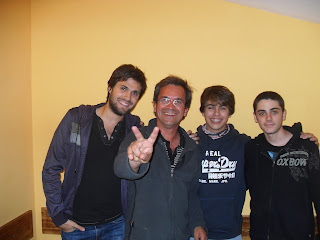 |
| Springtime in Catalunya |
 |
| My host in Granollers, Orland |
Spain has a long history of anarchist sentiment; its agricultural workers were right at home with anarchy's ideas of mutual aid and small scale collectivism. And among the people of Iberia, the Catalans in particular have had a long association with anarchy. Add to that Catalunya's long history of activism for independence, and you have a bit of a dilemma-- an anarquista can't really be an independentista, or vice versa, as independence implies national government-- yet many Catalans describe themselves as being both.
One of those who cannot integrate anarchism with national independence is Orland, who was my host in Granollers. Orland is a Medieval historian with an acute intellect who, while identifying himself with Catalunya, sees anarchism as a means to abolishing the state, any state, including a would-be Catalunya. Despite his intellect, and his reading of authors like Kropotkin, Orland is no idealogue-- he practices what he preaches; mutual aid and sharing all things in common. My time as his guest proved that.
Oriol, however, one of my co-hosts near Sant Celoni, is fine with being an anarchist who at the same time wants to see an independent Catalunya. A weekend taxi driver in Barcelona, and vegetable gardener and homemaker the rest of the week, Oriol is a hands-in-the-dirt, collective mutual aid, anarchist practitioner.
While familiar with anarchist ideology, Oriol prefers the vegetable garden to a book by Kropotkin.
His flatmates, Laia and Neus, are both teachers. Their flat is a bit of an experiment in anarchic collectivism, and the experiment seems to going well. There are no roles or duties assigned in their home; everyone simply fills in wherever needed.
Neus, who invited me to Santa Maria de Palautordera, teaches troubled kids from broken homes. Anyone who has ever been through the challenge of teaching even the most well adjusted kids can imagine the challenge Neus faces daily. But Neus, who has a love for all her students even if not particularly liking a few of them, enjoys her work despite the frustrations and difficulties.
Where I come from, the very idea of anarchism conjures up images of bomb-throwing seekers of mayhem and chaos. The reality is that anarchism is about orderly, self-governing mutual aid based on love of one's neighbor. Anarchists believe that people are inherently good, and don't need to be ruled over. While there have been misguided anarchists who have sought their ends through violence (as has been the case with nearly every ideology, including Western style democracy), the anarchists I have met have been peaceful, and they have been extraordinarily kind and generous hosts to this peace pilgrimage.
 |
| Santa Maria de Palautordera, with Montseny in the background |
 |
| Oriol, in front of a collective vegetable garden |
 |
| My host in Santa Maria, Neus |
 |
| Laia, Oriol, and Neus |
 |
| My camp between Sant Celoni and Santa Coloma. I saw a wild boar here. |
 |
| Catalan farmers with Catalan flags |
 |
| I was intensely curious to know what the book was that this shepherd was reading, but thought I'd already disturbed enough of his privacy with the photo. |
 |
| The town square in Santa Coloma de Farners |
After a night camping near the road, I came to Santa Coloma de Farners where I met my host Soraya, and her friend Roger. Both independentistas, Soraya and Roger continued the Catalan hospitality I have grown accustomed to. Soraya is a public gardener in Girona, and Roger works at a library and teaches indoor football to kids. As with my previous two hosts, I was given my leave of the house when they were absent, and treated to good food and company when they were present.
 |
| Roger with Soraya, who was my host in Santa Coloma |
 |
| Roger signs a petition while Soraya waits for the pen |
















































